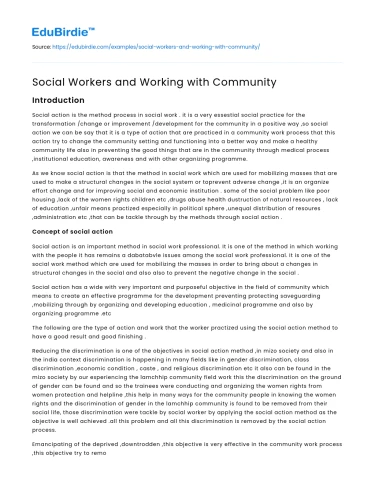Introduction
In contemporary society, the role of social workers extends far beyond individual case management and into the broader realm of community engagement. Social workers serve as vital connectors within communities, facilitating access to resources, advocating for social justice, and fostering collective well-being. This essay explores the multifaceted roles social workers play in community settings, examining their impact on both individual and collective levels. Through evidence-based practices and real-world examples, the discussion highlights the importance of social workers in addressing systemic issues and promoting communal resilience. Additionally, counter-arguments regarding potential limitations and challenges faced by social workers in community settings are addressed to provide a balanced perspective. Ultimately, this essay aims to underscore the indispensable contribution of social workers in nurturing thriving communities.
Empowering Communities Through Advocacy and Support
Social workers are pivotal in empowering communities by advocating for policies that promote social justice and equitable access to resources. They employ a range of strategies to engage with community members, identify their needs, and work collaboratively to address systemic barriers. According to a study by Healy and Hampshire (2016), social workers leverage their understanding of social policy and community dynamics to influence decision-making processes at local and national levels. For instance, in urban areas plagued by poverty and unemployment, social workers have been instrumental in developing job training programs and securing funding for community development initiatives. By fostering partnerships with local organizations, they ensure that marginalized groups have a voice in shaping policies that affect their lives.
Save your time!
We can take care of your essay
- Proper editing and formatting
- Free revision, title page, and bibliography
- Flexible prices and money-back guarantee
Moreover, social workers provide crucial support systems for vulnerable populations, including the elderly, immigrants, and those experiencing homelessness. Through direct service delivery, they assist individuals in navigating complex systems, such as healthcare and housing, thereby enhancing their quality of life. A case in point is the work of social workers in refugee resettlement programs, where they facilitate access to education, employment, and mental health services, enabling refugees to integrate successfully into their new communities. However, it is essential to acknowledge the challenges social workers face, such as limited resources and bureaucratic constraints, which can impede their ability to effect change. Despite these challenges, the commitment of social workers to community advocacy and support remains a cornerstone of their profession.
Building Community Resilience and Capacity
Another critical aspect of social work in community settings is fostering resilience and building capacity among community members. Social workers adopt a strengths-based approach, recognizing the inherent strengths and potential within communities to overcome adversity. As highlighted by Saleebey (2013), this approach shifts the focus from deficits to capabilities, empowering communities to leverage their assets in addressing challenges. For example, in disaster-prone areas, social workers collaborate with community leaders to develop emergency preparedness plans and resilience-building initiatives, thereby enhancing the community's capacity to respond to and recover from crises.
Furthermore, social workers play a crucial role in facilitating community education and awareness programs. By organizing workshops and training sessions, they equip community members with the knowledge and skills necessary for self-advocacy and sustainable development. These initiatives not only empower individuals but also strengthen social cohesion and collective efficacy. A notable example is the implementation of community-based health promotion programs, where social workers engage residents in addressing public health issues, such as substance abuse and mental health stigma. Despite these positive outcomes, social workers must navigate the complexities of diverse cultural norms and values, which can pose challenges to community engagement efforts. Nevertheless, their commitment to fostering resilience and capacity within communities remains unwavering.
Conclusion
In conclusion, social workers play an indispensable role in fostering community engagement and promoting social justice. Through advocacy, support, and capacity-building initiatives, they empower communities to address systemic challenges and enhance their overall well-being. While acknowledging the limitations and challenges they face, this essay has highlighted the profound impact of social workers on both individual and collective levels. By embracing a strengths-based approach and facilitating community-led initiatives, social workers contribute significantly to nurturing resilient and thriving communities. As society continues to grapple with complex social issues, the role of social workers in community settings is more critical than ever, underscoring the need for continued support and investment in this vital profession.






 Stuck on your essay?
Stuck on your essay?

